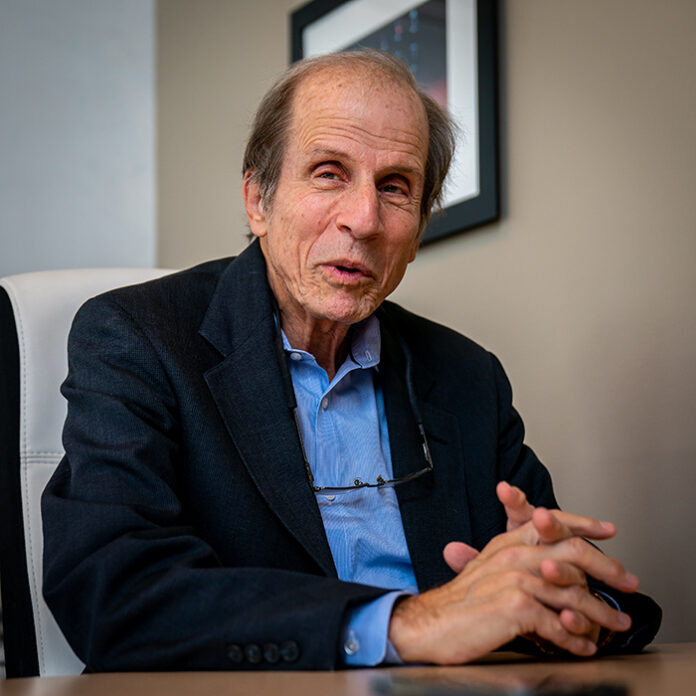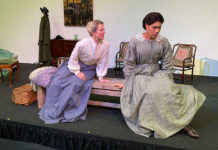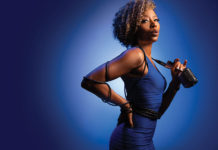
Public radio talk show host Michael Krasny left behind a legion of loyal listeners when he retired from his 28-year stint at KQED’s Forum in February 2021.
Fortunately, he couldn’t stay away from the microphone for long.
Krasny, 78, who has interviewed VIPs from all walks of life, including Barack Obama, Carl Sagan and Philip Roth, launched a podcast last summer. Grey Matter with Michael Krasny will sound familiar to Forum fans, with each hour-long episode consisting of the host conversing with an “opinion-shaper” and taking questions from the audience. However, there are some differences.
On Forum, the daily call-in radio show, Krasny reached more than 300,000 listeners during the week, the majority in the Bay Area. Grey Matter episodes drop several times a month, with a smaller, but global audience.
“I’ll do a program, a live program, and I’ll have questions from five to six continents,” Krasny said in an interview. “It’s kind of a kick.”
Yet, Krasny doesn’t speak on the phone with his listeners as he did on Forum. The Grey Matter audience members write their questions in real time, and those receiving the most “likes” will make it into the podcast. Krasny calls the process democratic, but admits he misses the call-in aspect of his previous program.
“I loved interacting directly with listeners,” Krasny said. “I’m not hearing their voices like I did on the radio; I’m reading their questions.”
The key aspects of the two programs are the same, according to Krasny, who notes that he works with an excellent team at Grey Matter and conducts in-depth interviews with fascinating guests. Recent podcast episodes have featured documentarian Ken Burns, linguist and New York Times columnist John McWhorter and author Isabelle Allende.
Coincidentally, the podcast originates from a threadbare studio in San Rafael, just a stone’s throw from KTIM, the now-defunct free-form radio station where Krasny’s illustrious talk show career began. In the late 1970s, Krasny pitched Beyond the Hot Tub, a weekly talk show, to San Rafael’s KTIM. The program manager liked the idea, and Krasny hasn’t stopped talking since.
One of Krasny’s most memorable interviews took place at KTIM with Jerry Garcia of the Grateful Dead. Even though it was years before the internet, Deadheads found out that Garcia was there, and a crowd gathered outside the station. But it was what happened inside the studio that Krasny remembers well.
“I was enjoying talking to Jerry, but suddenly he started putting something, some substance up his nose, and I immediately went to a public service announcement,” Krasny said. “I said to him, ‘You can’t do that in here.’ And he said ‘OK,’ and then he put everything away.”
Another four decades of radio followed Krasny’s time at KTIM, including eight years at KGO. But it seems that Krasny was best suited for KQED, as he always saw his role as that of a public servant. And he has served the public extremely well, delivering thoughtful, intelligent, substantive interviews with a long list of luminaries.
Not surprisingly, Jimmy Carter was “delightful,” Krasny said. Although he was prepared to dislike Pat Buchanan, instead he found the conservative pundit to be “charming with a high Q Score.” David Byrne of the Talking Heads and writer Gore Vidal were difficult to interview, but for different reasons.
“David Byrne was so creative, but so reticent,” Krasny said. “It was like pulling teeth. Gore Vidal was hard and memorable because he was intoxicated and antisemitic.”
Krasny has interviewed presidents, heads of the United Nations and Nobel Prize winners. Still, he says there is a broad spectrum of people that have moved him. There were ordinary people who were doing extraordinary things, the people in the trenches, as he calls them. One of his most notable interviews was with a group of African American women who took care of crack babies in Oakland.
Interviews with novelists and poets stay uppermost in Krasny’s mind. Literature is “my métier, my first love and passion,” he says. Krasny feels fortunate to have sat down with some of the greatest writers in American and world literature, including Saul Bellow, John Updike, Tony Morrison, Salman Rushdie and Carlos Fuentes.
When Krasny describes his interview with Nora Ephron, he tears up. It was no secret that Ephron had a complex relationship with her sister, and Krasny was having a disagreement with his sister at the time, prompting him to ask a question off-mic.
“I asked Nora, can I get some counsel from you?” Krasny said. “She was very gracious, and we talked about it. However, what stirs me when thinking about this is not only that my sister is now gone, but Nora Ephron was dying of cancer. Her family knew it, but nobody else knew it. And she took the time to talk to me about my sister, and I got some light from her.”
Krasny, too, has provided light to others. Certainly, he is best known as an erudite talk-show host; however, he has influenced people by wearing many important hats over the years. He taught English literature to thousands of San Francisco State University students during his tenure as professor, from 1970 until 2021.
Supposedly retired, Krasny can’t stay away from teaching either. He still teaches a literature course at Stanford University’s continuing education program and hosts an online discussion of five classic novels for the Book Passage in Marin County.
The consummate interviewer is working on a book about a topic he might know better than anyone—interviewing. His previous books include Off Mike: A Memoir of Talk Radio and Literary Life, Spiritual Envy: An Agnostic’s Quest, Sound Ideas and Let There Be Laughter: A Treasury of Great Jewish Humor and What It All Means.
Of course, Krasny also stays well-informed about current events, and says there’s much cause for concern in the world. Climate change, the real possibility of a nuclear weaponry accident and a dearth of leadership top his list. However, he’s optimistic as well.
“Where do we find hope is the big question,” Krasny said. “Where do we find what Emily Dickinson called ‘the thing with feathers?’ There’s a human spirit and there’s a resilience of the human spirit that I’d like to think will help us and the planet. That’s a lot of idealism, but there are passionate and dedicated people working on the issues facing us. That’s where I find hope.”







